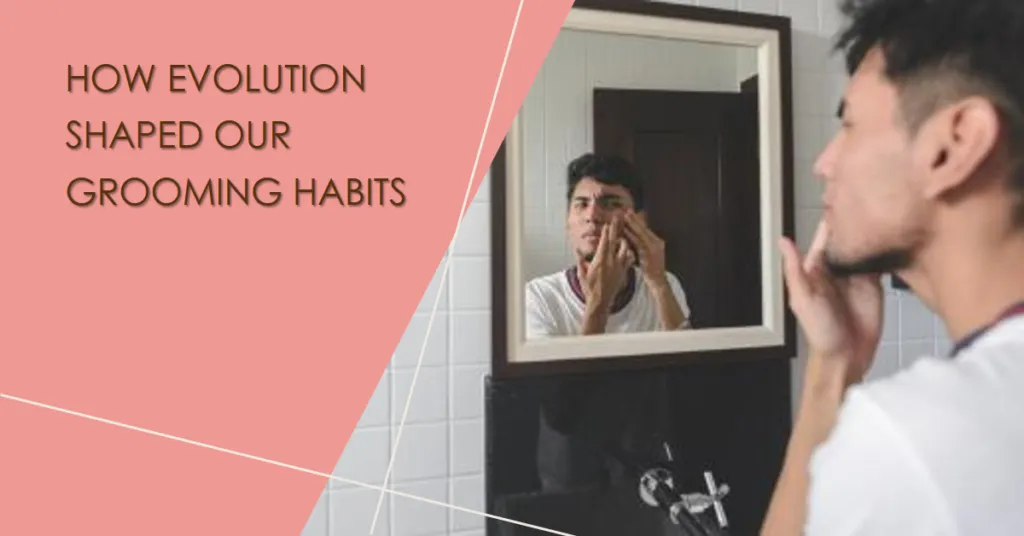While the world of “beauty” tends to be associated with women, men’s grooming habits are far from a recent fad. Driven by deep-rooted evolutionary imperatives, men have long meticulously crafted their appearance, transforming it into a canvas that silently speaks volumes about their health, status, and ultimately, their reproductive potential.
Signaling Fitness Through Grooming: Our hunter-gatherer ancestors existed in a harsh environment where survival hinged on physical prowess and resilience.
A well-groomed, healthy-looking individual likely possessed the strength and stamina to secure resources, defend their mates, and raise offspring.
Conversely, unkempt men, riddled with parasites or plagued by illness, signaled vulnerability and decreased fitness, leading to lower social standing and reproductive chances.
This primal link between grooming and perceived health continues to influence modern behavior, with neat hairstyles, clean-shaven faces, and toned physiques often subconsciously interpreted as markers of virility and genetic suitability.
Grooming as a Status Symbol: Beyond mere survival, grooming evolved as a tool for navigating social hierarchies. In competitive environments, conspicuous displays of resources and effort served as cues of dominance and influence.
Elaborate hairstyles, intricate body art, and even the adoption of specific grooming trends could send powerful messages about an individual’s social standing within a group. This phenomenon translates into the modern world, where well-tailored suits, expensive fragrances, and meticulous grooming choices can convey success, authority, and desirability to potential mates and competitors alike.
The Allure of Attraction: Perhaps the most potent evolutionary driver of male grooming is its role in attracting mates. Studies have shown that women consistently perceive well-groomed men as more attractive, healthier, and possessing better genes. Smooth skin, clear eyes, and well-defined muscles signal both masculinity and the ability to provide for offspring.
Additionally, grooming practices that involve intricate ornamentation or adherence to specific trends can showcase creativity and intelligence, qualities further enhancing attractiveness.
The Psychology of Grooming: Understanding the evolutionary roots of male grooming sheds light on its deeper psychological impact. Engaging in grooming rituals can boost self-confidence and self-esteem, knowing that one’s appearance aligns with societal expectations of attractiveness and success.
Conversely, neglecting grooming can lead to feelings of inadequacy and social withdrawal, highlighting the link between self-presentation and well-being.
Navigating the Modern Canvas: In today’s diverse and complex society, the evolutionary legacy of grooming manifests in myriad ways. While traditional markers of health and status remain influential, men have greater freedom to express their individuality through their grooming choices.
From bold beard styles to vibrant hair colors, modern grooming practices become tools for self-discovery and personal branding. This freedom, however, comes with its challenges. Men face societal pressures to conform to ever-shifting trends, navigate an often-confusing landscape of conflicting expectations, and grapple with the potential to be judged solely based on their appearance.
Deeper Definition: Just as evolution pushed men to prioritize grooming, it also instilled in them the desire for strength, resilience, and a well-defined physique. Particle Ab Firming Cream steps in to empower men who wish to enhance their natural body contours and achieve a firmer, more defined abdomen. Its unique blend of ingredients, including L-Carnitine, Caffeine, and Menthol, work synergistically to target stubborn abdominal fat, improve skin elasticity, and create a visibly toned appearance.
By addressing concerns beyond the surface, Particle Ab Firming Cream complements the evolutionary drive for a healthy, attractive physique, allowing men to confidently showcase their dedication to well-being and self-improvement.
In conclusion, understanding the evolutionary origins of male grooming allows us to appreciate the complex interplay between biology, psychology, and societal expectations that shape our choices. Men groom not just for vanity, but to signal health, status, and attractiveness, motivations deeply rooted in our ancestral past. As we navigate the diverse landscape of modern grooming, the key lies in harnessing the legacy of evolution while embracing individuality and acknowledging the power of self-care, both within and beyond the surface.

